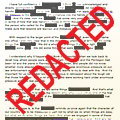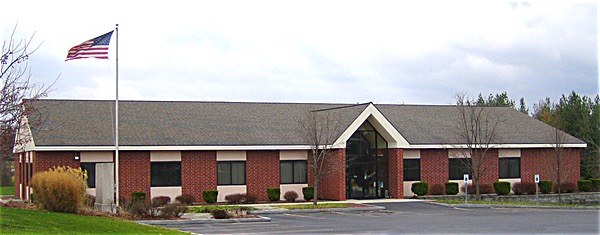- By Dan Veaner
- News
 Print
Print  The Lansing Town Board will update its Freedom Of Information Law (FOIL) to make procedures clearer and help the public understand how FOIL works and why some information must be held back. In a working session this month the Board directed Town Attorney Guy Krogh to rewrite the current law. Town Supervisor Ed LaVigne said the rewrite will 'bring the law into the 21st century'.
The Lansing Town Board will update its Freedom Of Information Law (FOIL) to make procedures clearer and help the public understand how FOIL works and why some information must be held back. In a working session this month the Board directed Town Attorney Guy Krogh to rewrite the current law. Town Supervisor Ed LaVigne said the rewrite will 'bring the law into the 21st century'."It came about largely as a discussion between (Town Clerk Deborah Munson) and I," Krogh explained. "She said she had been looking at the FOIL procedures, and they appear to be adequate, but they don't appear to cover all bases."
Lansing will benefit from Krogh's experience. He recently rewrote the Town of Enfield's FOIL law from the ground up, based on much research, recent recommendations from the NYS Association of Towns and the Committee on Open Government, and the procedures and laws of CUNY (City University of New York) and the Town of Stillwater after reviewing laws from over a dozen other communities. Krogh worked with the Enfield clerks to craft a law appropriately for their town.
That will give him a head start in writing Lansing's law, which will be adjusted to meet the Town's unique needs and align to staffing and procedures here. Krogh said Enfield has been a good proving ground because a wind farm project there has increased FOIL requests from one or two per year to about 20 per week.
Krogh told the board that there is no section on the Personal Privacy Protection Act in the Enfield version. Including such a provision is not mandated, but he said Munson had suggested including it so people requesting information could read ahead of time what they can expect to be redacted from materials they request.
"The Committee on Open Government issues rulings on the open meetings law and the freedom of Information law and the Personal Privacy Protection Act," Krogh said. "One of the biggest glitchy areas in FOIL is the need to redact some personally identifying information. In fact it's not even appropriate in response to a FOIL or even in your minutes to list a citizen's name and address. One or the other has to be redacted.
"The answer to that by some people is, well that's silly," he continued. "I can get that from a phone book or a tax roll, or other sources. The Committee on Open Government's response is, 'Well that may be true, but the one place you should not get it, by state law, is from your town.' So I wanted to explain to people, right in the law, that some information is taken out because you are not allowed to get it from us. You can get it from somewhere else, but you can't get it from us."
 Lansing Town Hall
Lansing Town HallBoard members indicated they wand a privacy act section in Lansing's law.
"I’d be comfortable putting it in," said Councilwoman Andra Benson. "So nobody takes it out personally on the clerk."
Munson says updating the law will spell out procedures both for government employees and citizens requesting information. She says there haven't been any large or complicated requests since she has worked in the Clerk's office, but FOIL requests occasionally come in.
"We don’t really get a lot of them," explains Town Clerk Deborah Munson. "We might have one a month. Sometimes they come in spurts. Then we might get two or three in a row, and then not have any in a month. Some of them tend to go directly to the Code Office and they just give me some paperwork. We don’t have a lot of them here."
A recent request was for a copy of the contract with the Town's animal control provider, and another requested a year's worth of utility bills, presumably from people who want to bid for those contracts. Code/Planning/ZBA Clerk Rachel Jacobsen says there are occasional requests for paperwork on code violations. She noted that her office often asks people requesting information to make a formal FOIL request so it can be fulfilled according to the lawful procedure. Again, the requests are rare - Jacobsen says the Codes Office only gets two or three per year.
Regardless, Krogh says the new law will spell out FOIL procedures and align them to the Clerk's Office staffing and current practices. Krogh said that both the Town Clerk and her deputy should be designated as Records Management Officer both to consolidate the record access officers and to have a single clearing house in the town government for FOIL requests.
"Because the Town Clerk is already the Records Management Officer it made sense to have the Town Clerk and the Deputy Clerk to be the administrative FOIL coordinator, so that everything comes into one central location," Munson said. That will insure that requests go to the appropriate departments quickly, and that requests are fulfilled according to the law, as well as to provide a central tracking procedure.
Requesting information in Lansing is a simple process. A form may be obtained from the Clerk's Office or simply downloaded from the Town Web Site (the Public Acces to Town Records law may also be downloaded there). If the Town must make copies of documents the requester must pay 25 cents per page and postage if the material is to be mailed. Munson says the charges can be avoided if she can email the information, or if the requester wishes to inspect the materials at the Town Hall.
If all or part of a request is denied, the form has a checklist of explanations such as an invasion of personal privacy, or the record requested doesn't exist or isn't maintained by the Town. Request denials may be appealed in writing within 30 days of being denied.
"Some of the exceptions that appear in FOIL are pretty obvious, like HIPPA," Krogh explained. "If there's something about someone's personal health care or something like that, obviously that has to be redacted. If we have something that says, 'So and so wasn't at the meeting because they had hip surgery,' out it comes. It may be public knowledge, but it's not appropriate for disclosure in a public document."
Krogh will write the law with the goal of setting a public hearing later this month, after which the Town Board will vote on whether or not to pass it into law.
v12i34



